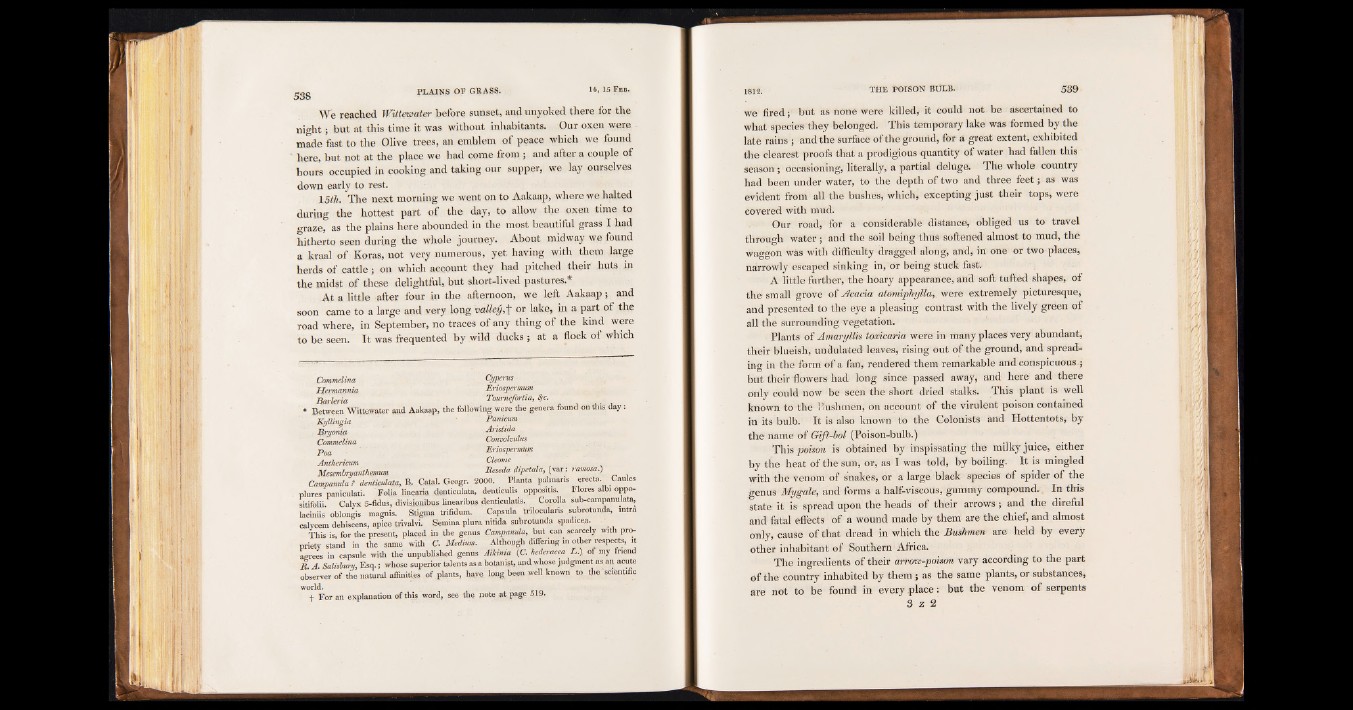
We reached Wittewater before sunset, and unyoked there for the
n ig h t; but at this time it was without inhabitants. Our oxen were
made fast to the Olive trees, an emblem of peace which we found
here, but not at the place we had come from ; and after a couple of
hours occupied in cooking and taking our supper, we lay ourselves
down early to rest.
15th. The next morning we went on to Aakaap, where we halted
during the hottest part of the day, to allow the oxen time to
graze, as the plains here abounded in the most beautiful grass I had
hitherto seen during the whole journey. About midway we found
a kraal of Koras, not very numerous, yet. having with them large
herds of cattle; on which account they had pitched their huts in
the midst of these delightful, but short-lived pastures,*
At a little after four in the afternoon, we left Aakaap; and
soon came to a large and very long valley,f or lake, in a part of the
road where, in September, no traces of any thing of the kind were
to be seen. It was frequented by wild ducks ; at a flock of which
Ctmmdina Cyperus
Hermannia Eriospermum
Barteria Tourneforiia, $c.
* Between Wittewater and Aakaap, the following were the genera found on this, d ay :
. KyUingia ' ‘ Pnnicum
Bryonia A r istlia
Commelina Cmvolmtm
p oa EriospermUm
Anthericum Cleome
Mesembryanthemum 2 « US ( var; W M M B I
Campanula f dmtiadata, B , Catal. Geogr. 2000. Planta p ataan s erecta. Caules
plures paniculate Folia linearia denticulata, denticulis opppsitis. Flores albi oppo-
sitifolii. Calyx 5-fidus, j m a onfljus linearibus denticulatis. Corolla sub-campanulata,
laciniis oblongis magnis. Stigma trifidum. Capsula trilocularis subrotunda, intra
ealyeem dehiscens, apice {rivalvi. Semina plura nitida subrotunda spadicea.
This is, for the present, placed in the genus Campanula, but can scarcely with propriety
stand in the same with C. Medium. Although differing in other respects, it
agrees in capsule with the unpublished genus A ikinia (C. liederacea L.), of my friend
R . A . Salisbury, Esq.; whose superior talents as a botanist, and whose judgment as an acute
observer of the natural affinities of plants, have wel1 known to the scientific
world. .
| For an explanation of this word, see the note at page 519.
we fired; but as none were killed, it could not be ascertained to
what species they belonged. This temporary lake was formed by the
late rains ; and the surface of the ground, for a great extent, exhibited
the clearest proofs that a prodigious quantity of water had fallen this
season; occasioning, literally, a partial deluge; The whole country
had been under water, to the depth of two and three feet; as was
evident from all the bushes, which, excepting just their tops, were
covered with mud.
Our road, for a considerable distance, obliged us to travel
through water ; and the soil being thus Softened almost to mud, the
waggon was with difficulty dragged along, and,- in one or two places,
narrowly escaped sinking in, or being stuck fast,
A little further, the hoary appearance, and soft tufted shapes, of
the small grove of -Acacia atomiphylla, were extremely picturesque,
and presented to the eye a pleasing contrast with the lively green of
all the surrounding vegetation.
Plants of Amaryllis toxicaría were in many places> very abundant,
their blueish, undulated leaves, rising out of the ground, and spreading
in the form of a fan, rendered them remarkable and conspicuous ;
but their flowers had long since passed away, and here and there
only could now be seen the short dried stalks. This plant is well
known to the llushmen, on account of the virulent poison contained
in its bulb. It is also known to the Colonists and Hottentots, by
the name of Gift-bol (Poison-bulb.)
This poison is obtained by inspissating the milky juice, either
by the heat of the sun, or, as I was told, by boiling. It is mingled
with the venom of snakes, or a large black species of spider of the
genus Mygale, and forms a half-viscous, gummy compound,. In this
state it is spread upon the heads of their arrows ; and the direful
and fatal effects of a wound made by them are the chief, and almost
only, cause of that dread in which the Bushmen are held by every
other inhabitant of Southern Africa.
The ingredients of their arrow-poison vary according to the part
of the country inhabited by them; as the same plants, or substances,
are not to be found in every place: but the venom of serpents
3 z 2